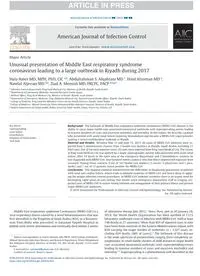
2018 Unusual presentation of Middle East respiratory syndrome coronavirus leading to a large outbreak in Riyadh during 2 PDF
Preview 2018 Unusual presentation of Middle East respiratory syndrome coronavirus leading to a large outbreak in Riyadh during 2
Major Article Unusual presentation of Middle East respiratory syndrome coronavirus leading to a large outbreak in Riyadh during 2017 Hala Amer MD, MPH, PhD, CIC a,b, Abdulrahman S. Alqahtani MD c, Hind Alzoman MD a, Nawfal Aljerian MD d,e, Ziad A. Memish MD, FRCPC, FACP d,f,g,* a Infection Control Department, King Saud Medical City, Ministry of Health, Riyadh, Saudi Arabia b Department of Community Medicine, National Research Center, Egypt c Medical Affairs, King Saud Medical City, Ministry of Health, Riyadh, Saudi Arabia d Department of Emergency Medicine, King Abdulaziz Medical City, National Guard Health Affairs, Riyadh, Saudi Arabia e College of Medicine, King Saud bin Abdulaziz University for Health Sciences, Riyadh, Saudi Arabia f College of Medicine, Alfaisal University, Prince Mohammed Bin Abdulaziz Hospital, Ministry of Health, Riyadh, Saudi Arabia g Hubert Department of Global Health, Rollins School of Public Health, Emory University, Atlanta, GA Key Words: superspreading renal failure hemodialysis Kingdom of Saudi Arabia viral load Background: The hallmark of Middle East respiratory syndrome coronavirus (MERS-CoV) disease is the ability to cause major health care-associated nosocomial outbreaks with superspreading events leading to massive numbers of cases and excessive morbidity and mortality. In this report, we describe a patient who presented with acute renal failure requiring hemodialysis and became a MERS-CoV superspreader, igniting a recent multihospital outbreak in Riyadh. Material and Results: Between May 31 and June 15, 2017, 44 cases of MERS-CoV infection were re- ported from 3 simultaneous clusters from 3 health care facilities in Riyadh, Saudi Arabia, including 11 fatal cases. Out of the total reported cases, 29 cases were reported from King Saud Medical City. The cluster at King Saud Medical City was ignited by a single superspreader patient who presented with acute renal failure. After 14 hours in the open area of the emergency department and 2 hemodialysis sessions he was diagnosed with MERS-CoV. One hundred twenty contacts who had direct unprotected exposure were screened. Among those contacts, 9 out of 107 health care workers (5 nurses, 3 physicians, and 1 para- medic) and 7 out of 13 patients tested positive for MERS-CoV. Conclusions: This hospital outbreak demonstrated the difficulties in diagnosing pneumonia in patients with renal and cardiac failure, which leads to delayed suspicion of MERS-CoV and hence delay in apply- ing the proper infection control procedures. In MERS-CoV endemic countries there is an urgent need for developing rapid point-of-care testing that would assist emergency department staff in triaging sus- pected cases of MERS-CoV to ensure timely isolation and management of their primary illness and prevent major MERS-CoV outbreaks. © 2018 Association for Professionals in Infection Control and Epidemiology, Inc. Published by Elsevier Inc. All rights reserved. Middle East respiratory syndrome Coronavirus (MERS-CoV) is a viral respiratory illness caused by a novel betacoronavirus that was first identified in the Kingdom of Saudi Arabia (KSA) in a business- man from Bisha who presented to Sulaiman Faqeeh Hospital in Jeddah with severe pneumonia and eventually died within 2 weeks of admission during July 2012.1 Since then, and as of January 28, 2018, the World Health Organization has been notified of 2,123 laboratory-confirmed cases of infection with MERS-CoV, with at least 740 deaths in 27 countries.2 More than 85% of reported cases to date have been from countries of the Eastern Mediterranean region, with KSA carrying the major burden of outbreaks (n = 1,527 cases, in- cluding 624 deaths [40% of cases]).2 The hallmark of this disease is the wide spectrum of presentation, ranging from completely as- ymptomatic to small family clusters of mild disease to major health care-associated nosocomial outbreaks with superspreading events leading to massive numbers of cases and excessive morbidity and mortality.3-5 Superspreading is a phenomenon well described in the * Address correspondence to Ziad A. Memish, MD, FRCPC, FACP, College of Medicine, Alfaisal University, Infectious Diseases and Research Department, Prince Mohammed Bin Abdulaziz Hospital, Ministry of Health, P.O. Box 54146, Riyadh, 11514 Saudi Arabia. E-mail address:
